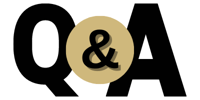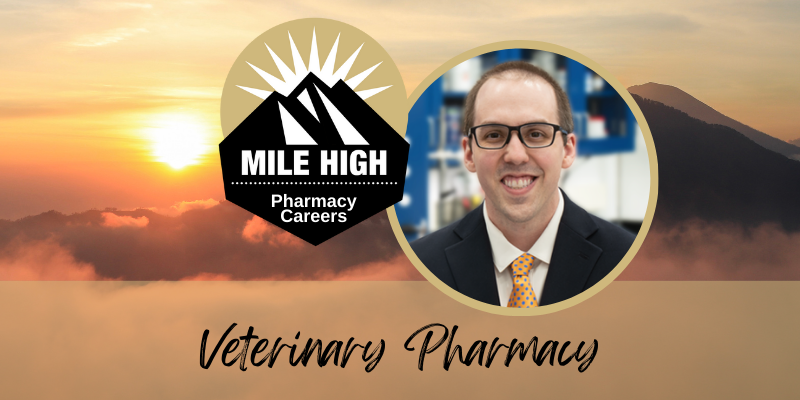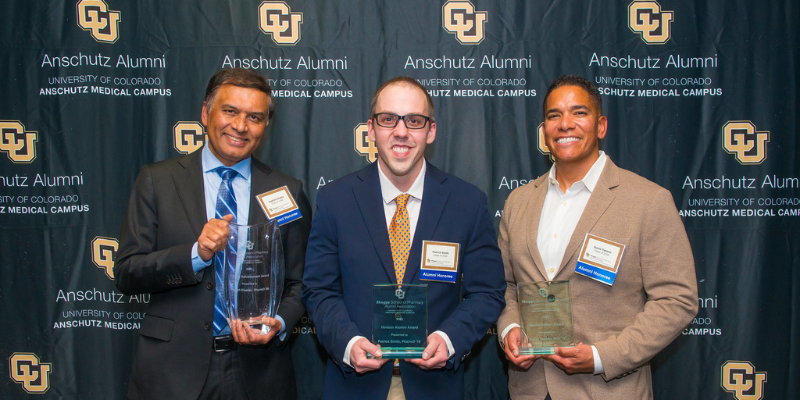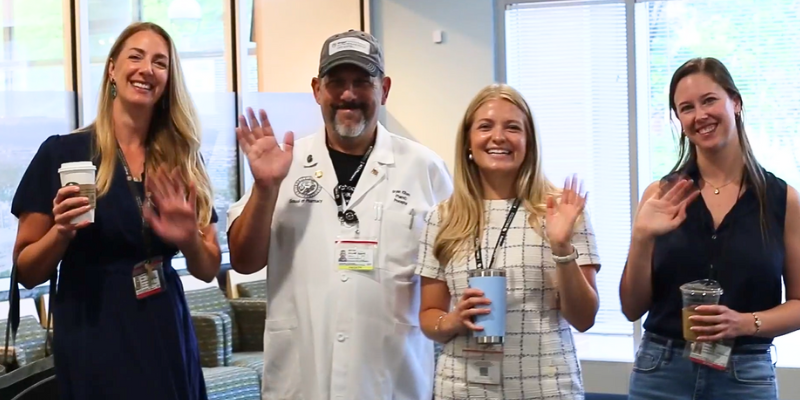In her own words, 2018 CU Pharmacy alumna Chelsea Sax reflects on her experience completing the PharmD program and entering the corporate sector as a managed care pharmacist with the pharmacy benefit management (PBM) company Express Scripts in an interview conducted by Career Services manager Laurie Sein as part of a series on specialty careers in pharmacy.


What is your current position and type of practice?
I work for Express Scripts. We fall under the Cigna enterprise. I am what you would call a managed care pharmacist. My official title is Product Strategy, Senior Advisor and today I serve as the lead consultant for actually all new generic product launches. Specifically, I work in supply chain. I'm in the pharmacy benefit management industry and really our focus at Express Scripts is on making healthcare more affordable, accessible, and simpler for payers, providers and, above all, our patients; with our main focus being lowering prescription costs for payers and patients. I work with a slew of teams, but really our main focus is to develop clinical solutions for our clients to maximize value for our members and our clients. It's fast paced; it's ever changing; constantly evolving; constantly adjusting, but it's really exciting.

What involvement do you have with direct patient care?
I work in a very nontraditional role, so I don't talk to patients at all. I don't see any drugs. I'm not working in that field. I work specifically in supply chain, so more business to business. I am working on behalf of our clients though for our members or patients, but it's very hands-off working with patients.

What does the typical work week or work day look like for you?

Chelsea Sax, PharmD '18 |
I have to say that every day is very different. Every week is very different. We're constantly pivoting; constantly reacting to the marketplace. The dynamics of the healthcare world are always changing, so there’s a lot to keep up with. I would say, logistically thinking more as the pharmacist, I'm in a lot of meetings. I'm working with a lot of our different cross-functional partners to ensure that we're all aligning on a strategy that's really going to maximize value for our clients as well as the organization. A lot of what we're doing is making sure we're reacting to those market dynamics. As I mentioned before, I'm leading as a consultant for all new generic product launches. I have a very heavy focus on the generic pipeline. Week over week, that's something I'm keeping track of as well as making sure that we're on track to execute certain strategies and coming up with new ideas. I would say that the job function adapts to what's most pressing and I always have something new on my plate. It's not that I complete something and then I'm done for the week. It's more “what's next?” Really staying focused on what our angle is and how we can accomplish that.

What would you say are some of the skills you obtained through pharmacy school that help you in this role?
I feel very fortunate, especially after meeting more folks across the country who have gone to different pharmacy schools. I think CU does a really good job practicing the different types of industries that you can go into. I did have a brief stint in our public health course where we were introduced to the PBM, the healthcare industry, and understanding all the different healthcare platforms, and the different peer groups like Medicare and Medicaid. That was a big help in at least giving me that brief introduction.
What gave me the most exposure to this type of industry was having a summer internship with Express Scripts. After my P2 year, I had to take a final early. I completed the final; went home to pack. I left for St. Louis, Missouri and started my internship that Monday. Express Scripts puts on an incredible internship program. I believe there were seven other pharmacists from across the country that came into this program. At the time, I was what they called the drug trend and formulary solutions intern where I got 13 weeks of exposure to the PBM industry and I was immediately hooked. I think a lot of students go into pharmacy school and have this idea of pursuing community pharmacy or hospital pharmacy and taking more of that clinical avenue. As soon as I realized there was this bigger world of being able to do something more in this business setting, I just I couldn't get enough. So, I kept thinking more and more about how I wanted to better tailor my school experience to help me excel in this type of career.
The clinical aspect is very important in the managed care world. You're definitely, as a pharmacist, very valued for your clinical opinion and expertise. There's a lot that you can get out of just your standard clinical rotations, whether it be hospital or retail. Other things that helped were through the rotations. I did another rotation coming back into the PBM industry, and getting another view of other things that I can do in this industry. You think of one company just doing certain things, but the magnitude and the reach that we have across all the different patients is incredible. There's so much that you can do in this type of industry.

You mentioned having strategy meetings. Who are the individuals typically in those meetings helping make decisions? What is a project you’ve worked on that comes out of those meetings?
As I mentioned before, I work with a ton of different cross-functional teams. Express Scripts is a very large organization and there's a lot of organizations within the Express Scripts umbrella. I work with our home delivery pharmacy on drug procurement; our specialty pharmacy Accredo; pharma contracting, and negotiators. I work heavily with finance. I like to think of this role taking this clinical concrete evidence to really help drive these financial business decisions to really maximize again savings for our clients. It's a process where I work with formulary. When a lot of people think of managed care they think of formulary, pharmacy and therapeutics committee. That's really the essence of where all these business decisions derive from. So, first and foremost, what is the most clinically appropriate and then what is the most cost effective. I also work with different group purchasing organizations. It's all over the board.
One project where I lead the strategy behind the program is part of a suite of solutions called the SafeguardRx Solutions. It’s a value-based contracting platform that’s striving to create as much value as we can for members and clients, imploring pharma to give reason behind their prices or pharmaceutical prices, getting into outcomes-based contracting as well. One of the components of that is our market events protection program which really tries to respond to any sort of event in the marketplace that can create a lot of financial issues for clients. Think of when Mylan EpiPen took that huge price increase a few years ago. That's really what our team works with. I have to work with formulary, clinical partners, finance and all these different platforms to try to track any sort of market events. It’s even to just keeping track of industry news.

What is your favorite thing about working in PBM and with Express Scripts?
I would say the level of exposure. The dynamics are changing all the time. It's responding to the marketplace. It's understanding what's going on even from a federal regulation standpoint and what's happening on the Hill. I’m thinking of that new Medicare rule that recently was pushed back where they're trying to instill point-of-sale rebates. There are so many larger stakeholders involved in the healthcare world in general that have these downstream impacts on decisions that we make. So, I think that's one thing I really enjoy and it's what really captivated me about managed care. I'm in a position where I'm able to impact millions of lives and not just working from patient to patient. Don't get me wrong, it’s so important having that patient centric focus. Being able to make these very important business decisions to try to drive as much value and savings for all of our patients is just an incredible position to be in.

Was there anything you were you not prepared for going into this position or into Pharmacy Benefit Management (PBM)?
I would say the corporate environment. It’s very different. We have all these different acronyms for business terms, even payment methods through managed care. That's how everyone speaks. I even remember as an intern going into one of my first meetings. I felt like they were speaking a different language. You quickly pick up the language, but it’s something you can't be exposed to in school. Every industry has their own language.
Another thing is a strong financial acumen. As pharmacists, we're very detail oriented. We have to be very savvy when it comes to calculations, but it's just a different format in trying to understand the economics of the PBM. Getting into how all the financials work is something that's hard to be prepared for until you're in it.

What's been your proudest moment or a highlight of your career so far?
I always say, even when talking with other pharmacists, that it takes a type of character to like being in this type of world. It's very self-driven and self-motivated work putting yourself out there. I would say my proudest moment so far as pharmacist is last year I was awarded the supply chain champion top performer by Cigna for my contributions made to the supply chain within my first full year at Express Scripts, so that was really exciting and a really proud moment.
What’s been so exciting for me too is the networking opportunity. Just the level of exposure that I get in this type of role, I've met some incredible people who lead this industry who are so far ahead of the curve and just all of the different strategies and how clever some of these people are. I feel like I’ve had so many mentors throughout this process. Just being able to confide in certain people and know that there are so many opportunities out there, that's something that has really been exciting for me.

What advice would you pass on to students or to upcoming graduates who are interested in this area of practice?
Get involved in joining different organizations such as the Academy of Managed Care Pharmacy (AMCP), which I think is an excellent insight into what goes on in the managed care world even beyond school. I'm a member of AMCP today, and the resources that they have are just unlimited and they're always keeping track of what's changing in the managed care industry. Also explore and look outside of your typical retail or hospital internships, although they too are very important in pharmacy school. Looking at different summer internships is how I found the Express Scripts internship. I knew I wanted to do something a little bit different than working at the current retail chain I was at during pharmacy school. I had this very limited view of what I thought I was getting myself into with the internship. As soon as I got into it, things just expanded from there. It was unreal.
Lastly, I think a lot of times you get stuck into this idea of pursuing a clinical residency after completing pharmacy school. I definitely was in that position, but there are managed care residencies out there as well. I highly implore students to take advantage of and look into these residencies, whether that be through a health plan or a hospital system. It’s a very valuable experience.
Want to view the entire interview with Dr. Sax and check out other resources available through CU Pharmacy Career Services? Access Handshake, the university's portal for career guidance. Learn more about activities offered through Career Services including the upcoming Hire CU Career Fair.




